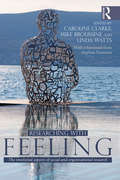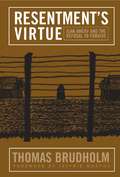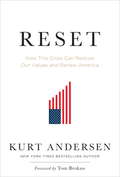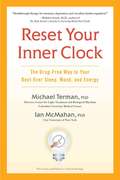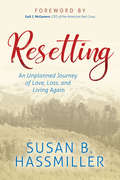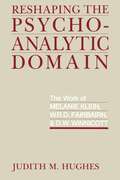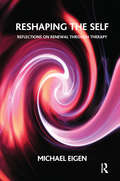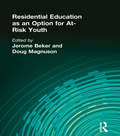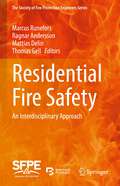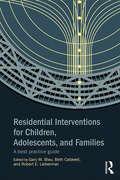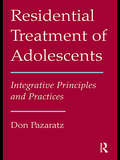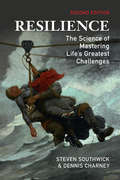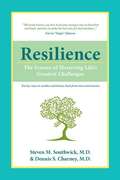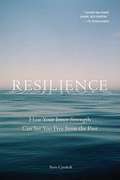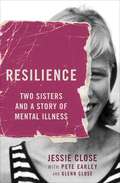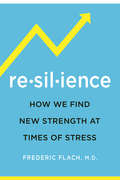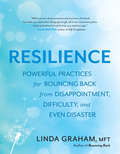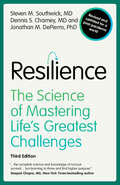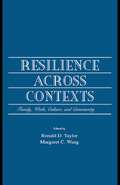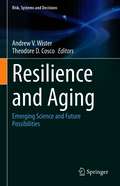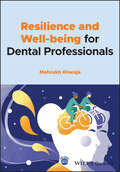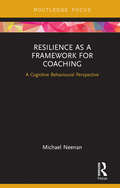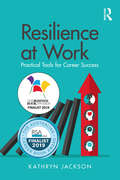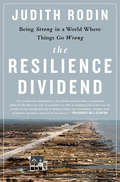- Table View
- List View
Researching with Feeling: The Emotional Aspects of Social and Organizational Research
by Caroline Clarke Mike Broussine Linda WattsWhy should researchers be interested in their feelings and emotions as they carry out research? Emotion is what it is to exist, to be human, and is present in every sphere of our lives. All activities are infused with emotion, even those that are constructed as ‘rational’, because rationality and emotionality are interpenetrated and entwined because all thinking is tinged with feeling, and all feeling is tinged with thinking. This book illuminates the emotional processes of doing social and organizational research, and the implications of this for the outcomes of research. With contributions from leading academics and research practitioners, it addresses the significant issue of the sometimes intense emotional experiences involved in doing research and the implications it has for the theory and practice of social research. By examining the nature of feelings and emotions, it explores how we might understand researchers’ emotions and experiences, and considers the often powerful feelings encountered in a variety of research contexts. Topics discussed include: power relations; psycho-social explanations of researcher emotions; paradoxical relations with research participants and the sometimes disturbing data that is gained; research supervision; the politics of research; gender; publishing, undergoing vivas and presenting at conferences. This book will therefore be a valuable companion to researchers and research students from the start of their career onwards.
Resentment's Virtue: Jean Amery and the Refusal to Forgive
by Thomas BrudholmMost current talk of forgiveness and reconciliation in the aftermath of collective violence proceeds from an assumption that forgiveness is always superior to resentment and refusal to forgive. Victims who demonstrate a willingness to forgive are often celebrated as virtuous moral models, while those who refuse to forgive are frequently seen as suffering from a pathology. Resentment is viewed as a negative state, held by victims who are not "ready" or "capable" of forgiving and healing. Resentment's Virtue offers a new, more nuanced view. Building on the writings of Holocaust survivor Jean Améry and the work of the South African Truth and Reconciliation Commission, Thomas Brudholm argues that the preservation of resentment can be the reflex of a moral protest that might be as permissible, humane or honorable as the willingness to forgive. Taking into account the experiences of victims, the findings of truth commissions, and studies of mass atrocities, Brudholm seeks to enrich the philosophical understanding of resentment.
Reset: How This Crisis Can Restore Our Values and Renew America
by Kurt Andersen"This is the end of the world as we've known it," Kurt Andersen writes in Reset. "But it isn't the end of the world." In this smart and refreshingly hopeful book, Andersen--a brilliant analyst and synthesizer of historical and cultural trends, as well as a bestselling novelist and host of public radio's Studio 360--shows us why the current economic crisis is actually a moment of great opportunity to get ourselves and our nation back on track. Historically, America has always shifted between wild, exuberant speculation and steady, sober hard work, as well as back and forth between economic booms and busts, and between right and left politically. This is one of the rare moments when all these cycles shift dramatically and simultaneously--a moment when complacency ends, ossified structures loosen up, and enormous positive change is possible. The shock to the system can enable each of us to rethink certain habits and focus more on the things that make us authentically happy. The present flux can enable us as a society to consolidate the enormous gains of the last several decades in areas such as technology, crime prevention, women's and civil rights, and the democratization of the planet. We can reap the fruits of a revival of realism and pragmatism at home and abroad. As we enter a new era of post-party-line common sense, we can start to reinvent hopelessly broken systems-in health care, education, climate change, and more-and rediscover some of the old-fashioned American values of which we've lost sight. In Reset, Andersen explains how we've done it before and why we are about to do it again--and better than ever.
Reset Your Inner Clock
by Michael Terman Ian McmahanAn enlightened approach to insomnia, depressed mood, fatigue, and other sleep-related problems of everyday life, harnessing the power of light therapy to reset the natural clock. Sleep problems and depressed mood often go hand in hand, forming a frustrating cycle. Michael Terman, Ph.D., has devoted his career to studying the brain functions that feed these disorders. In Reset Your Inner Clock, Terman and Ian McMahan, Ph.D., reveal the heart of his findings, a powerful program that recalibrates our internal clocks--our exquisitely designed, natural sensitivity to the timing and brightness of light exposure. These delicate mechanisms are often decimated by the modern demands of a 24/7 lifestyle. Beginning with a questionnaire that pinpoints the problem areas, Terman helps readers decipher when their natural internal night begins and ends. The treatment process can then start, incorporating the power of natural light and, when necessary, supplemental light therapy. His approach has brought relief to thousands of sleep sufferers, as well as those burdened by bipolar disorder, seasonal affective disorder, depression, sleep disorders due to around-the-clock work schedules, and other impediments to vibrant health. For the first time, his findings are now available for a general audience, sharing the essential elements of chronobiology in clear, authoritative, scientifically grounded chapters that are easy to apply to a variety of situations.
Resetting: An Unplanned Journey of Love, Loss, and Living Again
by Susan B. HassmillerResetting shares the story of a personal grief journey and helps transform today’s understanding of the human condition. Although grief and loss are universal human conditions around since the beginning of time, the idea of loss is still greatly feared, ignored, distained, undiscussed, and certainly not prepared for. It is no wonder people feel alone and isolated in their feelings and thoughts when loss comes to them. Longtime nurse, Susan Beth Hassmiller, who is no stranger to death, has experienced the journeys of suffering and death in her patients as well as her personal life in which she was completely blindsided by the physical, spiritual, and emotional toll.Resetting is written in a daily diary format in which Susan opens a very private window to the actual feelings and thoughts she experienced in the grief process. Resetting is raw and gripping as it illustrates a new level of understanding of the human condition. Susan helps those who have suffered loss gain a new perception and a greater sense of grief while learning lessons on how to help those suffering from grief—from words to say to tasks to take on.
Reshaping the Psychoanalytic Domain: The Work of Melanie Klein, W.R.D. Fairbairn, and D.W. Winnicott
by Judith M. HughesTracing the line of succession from Sigmund Freud, through Melanie Klein to Fairbairn and Winnicott, Judith Hughes demonstrates the internal development of the British school of psychoanalysis and the coherence of its legacy. Both lay reader and professional will find the book illuminating.
Reshaping the Self: Reflections on Renewal Through Therapy
by Michael EigenThe author relates the stories of two patients reshaping their lives into something they could believe in, and examines the complex roles of the therapist and therapy, self/other and mind/body relations, and the dramatic interplay of faith and catastrophe.
Residential Education as an Option for At-Risk Youth
by Jerome Beker Doug MagnusonResidential Education as an Option for At-Risk Youth explores recent residential programs in Israel, draws comparisons with their European counterparts, and recommends practical approaches for the revitalization of such programs in the United States. This volume refutes the conventional professional “wisdom” in the United States that residential group care programs for children and youth are intrinsically flawed and counterproductive. Instead, it delivers effective models for the implementation of effective residential services. The editors and authors demonstrate the growing need for residential programs, given the overburdened family foster care resources, swelling numbers of “zero-parent” families, and homeless youth. Though the United States helped launch and develop residential services in Europe in the aftermath of World War II and has produced many excellent thinkers in the domain of quality residential group care, American programs have languished in recent decades. This book is designed to accelerate and facilitate progress in revamping and establishing excellent residential group care. The authors examine residential education as a developmentally based alternative to the more clinically and correctionally oriented programs for marginal children and youth dominating this field in the United States.The authors present their material in the context of appropriate theoretical principles, yet in practical ways that will permit program developers and managers to implement it effectively. Some of the specific areas chapters discuss are: exemplary Israeli programs as observed by visiting American professional in social work and allied fields important program variables and the cultural influences that may affect them African American experience for such programs a conceptual model for building successful residential education programs key organizational and management considerationsResidential Education as an Option for At-Risk Youth serves as a vital resource for ambitious program developers and managers wishing to reconceptualize and enrich their programs. It will also benefit advanced students, practitioners, and decision makers who have had, heretofore, few resources to rely on when seeking to promote more effective programs for socially marginal children and youth.
Residential Fire Safety: An Interdisciplinary Approach (The Society of Fire Protection Engineers Series)
by Marcus Runefors Ragnar Andersson Mattias Delin Thomas GellThis book provides a comprehensive overview of deaths and injuries from residential fires as well as the most up to date information on evidence-based approaches to reduce this problem. The volume serves as a guide for professionals working in the field of fire prevention and as a textbook for instruction in universities and fire service schools. The authors’ interdisciplinary approach, where public health methodology is combined with fire protection engineering, medicine, and policy science, is quite distinctive outside of the technical literature devoted to larger scale fire events. Traditional textbooks on fire protection tend to describe the problem as purely technical, whereas in essence it is a problem of human vulnerability. In this book, readers will find lucid and rigorous descriptions of various risk groups and effective preventive measures that are effective, both in general and with respect to the different risk groups. They will also find work processes to facilitate risk reduction. Summarizing state-of-the-art knowledge and giving guidance for the future, both in terms of preventive efforts and ongoing research, Residential Fire Safety: An Interdisciplinary Approach, is ideal for students, educators, and practitioners of residential fire protection.
Residential Interventions for Children, Adolescents, and Families: A Best Practice Guide
by Gary M. Blau Beth Caldwell Robert E. LiebermanNow more than ever there is a need to ensure that best practices are being used in residential programs. As the focus on costs and outcomes increase, residential programs must clearly demonstrate that the interventions provided are efficient and effective. Readers will learn how to: Create strength-based, empowering and healing environments; Better engage and partner with children, adolescents and families, in meaningful ways; Support those who have experienced trauma and loss, and to prevent and eliminate the use of restraint and seclusion; Respect and include cultural indices in practices; Train, mentor, supervise, support and empower staff about how to deliver promising and best practices, and evidence-informed and evidence-based interventions; and Track long-term outcomes, and create funding strategies to better support sustained positive outcomes. This book encourages readers to think strategically about how agencies, communities and systems can identify and implement actions that lead to positive change and how to work more collaboratively to improve the lives of children and adolescents who have experienced emotional and behavioral life challenges and their families.
Residential Treatment of Adolescents: Integrative Principles and Practices
by Don PazaratzIn Residential Treatment of Adolescents, Pazaratz discusses how practitioners can remain emotionally available for the needs of their residents without feeling overwhelmed. Readers will be apprised of ways to deal judiciously with residents who try to circumvent, con, play workers off each other, and even attempt to seduce or manipulate the worker. Each chapter instructs readers to observe their clients and comprehend how they relate to the total environment, in order to determine what the resident is feeling and how he or she makes use of personal resources. This contextual understanding helps to answer questions such as: What are the youngster’s goals? What factors obstruct the change process? What are the youngster’s defenses and against what? How does the youngster use the milieu (staff and peers) and the community as resources? How can the youngster get significant others to react differently to him or her? Ultimately, Pazaratz demonstrates that effective treatment staff do not create dependent youth, make treatment oppressive, or enact a role based upon giving consequences. Instead, the reader will learn to integrate diverse intervention strategies into the resident’s normal cycle of daily life and how to interact within a team structure.
Resilience: The Science Of Mastering Life's Greatest Challenges
by Dennis S. Charney Steven M. SouthwickMany of us will be struck by one or more major traumas sometime in our lives. Perhaps you have been a victim of sexual abuse, domestic violence or assault. Perhaps you were involved in a serious car accident. Perhaps you are a combat veteran. Maybe you were on the beach in Thailand during a tsunami, or in New Orleans during Hurricane Katrina. Or maybe, you are among the millions who have suffered a debilitating disease, lost a loved one or lost your job. <P><P>This inspiring book identifies ten key ways to weather and bounce back from stress and trauma. <P>Incorporating the latest scientific research and dozens of interviews with trauma survivors, it provides a practical guide to building emotional, mental and physical resilience. Written by experts in post-traumatic stress, this book provides a vital and successful roadmap for overcoming the adversities we all face at some point in our lives.<P> Covers ten key resilience factors, optimism, moral compass, role models, religion and physical training, bringing hope and inspiration for overcoming adversity.<P> First-person interviews with trauma survivors enable learning from real-life examples of how to face your fears, gain strength and grow as a result of difficult experiences.<P> Provides recommendations for building resilience based on sound scientific knowledge.
Resilience
by Dennis S. Charney Steven M. SouthwickMany of us will be struck by one or more major traumas sometime in our lives. Perhaps you have been a victim of sexual abuse, domestic violence or assault. Perhaps you were involved in a serious car accident. Perhaps you are a combat veteran. Maybe you were on the beach in Thailand during a tsunami, or in New Orleans during Hurricane Katrina. Or maybe, you are among the millions who have suffered a debilitating disease, lost a loved one or lost your job. This inspiring book identifies ten key ways to weather and bounce back from stress and trauma. Incorporating the latest scientific research and dozens of interviews with trauma survivors, it provides a practical guide to building emotional, mental and physical resilience. Written by experts in post-traumatic stress, this book provides a vital and successful roadmap for overcoming the adversities we all face at some point in our lives.
Resilience: How Your Inner Strength Can Set You Free from the Past
by Boris CyrulnikOne out of every two people will experience trauma, says psychiatrist Boris Cyrulnik, and one in ten will remain a prisoner of that suffering. Why are some children permanently damaged by difficult childhoods, while others grow up into secure, creative, loving adults? This book, based on Dr. Cyrulnik's broad experience with victims of childhood distress, offers a message of hope for everyone concerned about the impact of deprivation and such traumatic events as separation, emotional or sexual abuse, and violence in the environment. The ghosts of the past keep on whispering to the child within the adult. Through dozens of moving, vivid examples, Dr. Cyrulnik describes the ingredients of resilience, the ability to heal the wounded self and move on, to make sense of what happened back then and form new emotional and social ties. Affection is such a vital need, he writes, that those who were deprived of it will attach themselves intensely to anything that rekindles a spark of life, whatever the cost. From the earliest parent-child bonding to the sexual turbulence of the teenage years, this book shows what makes for success or failure in the struggle to gain freedom from early pain.
Resilience: Two Sisters and a Story of Mental Illness
by Pete Earley Glenn Close Jessie CloseAt a young age, Jessie Close struggled with symptoms that would transform into severe bipolar disorder in her early twenties, but she was not properly diagnosed until the age of fifty. Jessie and her three siblings, including actress Glenn Close, spent many years in the Moral Re-Armament cult. Jessie passed her childhood in New York, Switzerland, Connecticut, Zaire (now the Democratic Republic of Congo), and finally Los Angeles, where her life quickly became unmanageable. She was just fifteen years old.Jessie's emerging mental illness led her into a life of addictions, five failed marriages, and to the brink of suicide. She fought to raise her children despite her ever worsening mental conditions and under the strain of damaged romantic relationships. Her sister Glenn and certain members of their family tried to be supportive throughout the ups and downs, and Glenn's vignettes in RESILIENCE provide an alternate perspective on Jessie's life as it began to spiral out of control. Jessie was devastated to discover that mental illness was passed on to her son Calen, but getting him help at long last helped Jessie to heal as well. Eleven years later, Jessie is a productive member of society and a supportive daughter, mother, sister, and grandmother. In RESILIENCE, Jessie dives into the dark and dangerous shadows of mental illness without shying away from its horror and turmoil. With New York Times bestselling author and Pulitzer Prize finalist Pete Earley, she tells of finally discovering the treatment she needs and, with the encouragement of her sister and others, the emotional fortitude to bring herself back from the edge.
Resilience: How We Find New Strength At Times of Stress (A\self-help Classic Ser.)
by Frederic FlachLearn to bounce back from life's inevitable crises by making friends with stress.There's no escaping stress. It appears on our doorstep uninvited in the shattering forms of death and divorce, or even in the pleasant experiences of promotion, marriage, or a long-held wish fulfilled. Anything that upsets the delicate balance of our daily lives creates stress. So why do some people come out of a crisis while others never seem quite themselves again? Now, Dr. Frederic Flach takes the anxiety out of hard times by showing you how to embrace you fears and become stronger because of them. Drawing on over thirty years of experience, Flach reveals the remarkable antidote to the destructive qualities of stress: RESILIENCE.
Resilience: Powerful Practices for Bouncing Back from Disappointment, Difficulty, and Even Disaster
by Linda GrahamWhether it’s a critical comment from the boss or a full-blown catastrophe, life continually dishes out challenges. Resilience is the learned capacity to cope with any level of adversity, from the small annoyances of daily life to the struggles and sorrows that break our hearts. Resilience is essential for surviving and thriving in a world full of troubles and tragedies, and it is completely trainable and recoverable — when we know how. In Resilience, Linda Graham offers clear guidance to help you develop somatic, emotional, relational, and reflective intelligence — the skills you need to confidently and effectively cope with life’s inevitable challenges and crises.
Resilience
by Steven M. Southwick Dennis S. CharneyHumans are remarkably resilient in the face of crises, traumas, disabilities, attachment losses and ongoing adversities. To date, most research in the field of traumatic stress has focused on neurobiological, psychological and social factors associated with trauma-related psychopathology and deficits in psychosocial functioning. Far less is known about resilience to stress and healthy adaptation to stress and trauma. This book brings together experts from a broad array of scientific fields whose research has focused on adaptive responses to stress. Each of the five sections in the book examines the relevant concepts, spanning from factors that contribute to and promote resilience, to populations and societal systems in which resilience is employed, to specific applications and contexts of resilience and interventions designed to better enhance resilience. This will be suitable for clinicians and researchers who are interested in resilience across the lifespan and in response to a wide variety of stressors.
Resilience: The Science of Mastering Life's Greatest Challenges
by Steven M. Southwick Dennis S. Charney Jonathan M. DePierroLife presents us all with challenges. Most of us at some point will be struck by major traumas such as the sudden death of a loved one, a debilitating disease, or a natural disaster. What differentiates us is how we respond. In this important book, three experts in trauma and resilience answer key questions such as What helps people adapt to life's most challenging situations?, How can you build up your own resilience?, and What do we know about the science of resilience? Combining cutting-edge scientific research with the personal experiences of individuals who have survived some of the most traumatic events imaginable, including the COVID-19 pandemic, this book provides a practical resource that can be used time and time again. The experts describe ten key resilience factors, including facing fear, optimism, and relying on role models, through the experiences and personal reflections of highly resilient survivors. Each resilience factor will help you to adapt and grow from stressful life events and will bring hope and inspiration for overcoming adversity.
Resilience Across Contexts: Family, Work, Culture, and Community
by Ronald D. Taylor Margaret C. WangA number of societal risks pose serious challenges to families' well-being, many of which cut across divisions of class and race. These challenges include: changes in the labor market and economy; the increasing participation of mothers in the labor force; the changing nature of family structure and the composition of households; and the increase in the number of immigrant families. Key institutions in the lives of families, including places of employment and schools, can play a significant role in fostering families' capacity to adapt to the potential challenges they face. Resilience Across Contexts: Family, Work, Culture, and Community presents papers--written by leading scholars in varied disciplines including economics, developmental and educational psychology, education, and sociology--discussing factors that influence resilience development. The authors' research focuses on emerging issues that have significant implications for policy and practice in such areas as employment and new technologies; maternal employment and family development; family structure and family life; immigration, migration, acculturation, and education of children and youth; and social and human services delivery. The book's overall goal is to take stock of what is known from research and practice on some of the challenges facing children and families for policy development and improvement of practices.
Resilience and Aging: Emerging Science and Future Possibilities (Risk, Systems and Decisions)
by Andrew V. Wister Theodore D. CoscoOlder aged adults face many adversities over the later life course. This edited volume will address the ways in which seniors bounce back from different types and combinations of adversity – termed “resilience”. While research has been accumulating that identifies inherent abilities and external resources needed to adapt and navigate stress-inducing experiences among aging and older adults, gaps remain in understanding the unique elements and processes of resilience. A series of chapters included in this book will address several overarching questions: why do some older individuals/families/communities adapt to adversity better than others; what are modifiable behavioral protective/risk factors related to resilience; and how can we foster resilience at the individual/community level and which approaches show the most promise?The spectrum of aging-related challenges and responses addressed in this book include: mental health; physical/functional health problems; multimorbidity; socio-economic deprivation; social isolation and loneliness; cultural dimensions of loneliness; housing/homelessness problems; and environmental disasters. This book presents cutting-edge science at the conceptual, methodological, empirical and practice levels applied to emerging resilience sub-fields in gerontology. It will also present potential areas of future research, policy and practice linked to these areas.During a period of the most rapid population aging in the US, Canada and many other nations, coupled with heightened global socio-political change, extending our knowledge of resilience will help society to make important adjustments to maximize health and wellness of older individuals. Supporting and enhancing resilience through technological, social and/or community-level advances in geroscience will help those facing adversity to thrive by harnessing, stretching, and leveraging a wide array of potential resources. The promotion of healthier older populations has far-reaching consequences for health care and social/community support systems, both in terms of public health including pandemic response, and the development and implementation of innovations in treatment and practice guidelines.
Resilience and Well-being for Dental Professionals
by Mahrukh KhwajaResilience and Well-being for Dental Professionals Essential reading for dental professionals and other healthcare workers wanting to build emotional resilience and positive mental health Dentistry is a high-stress profession with elevated rates of anxiety, depression, burnout, suicidal thoughts and self-harm. Chronic workplace stress is a growing concern as it can severely damage the mental health of dental professionals and negatively impact their ability to provide appropriate care. Psychological interventions have been shown to greatly benefit the well-being and emotional resilience of the medical and healthcare community, yet resources that provide preventative tools are limited. Resilience and Well-being for Dental Professionals, is designed not only to combat occupational hazards in Dentistry, such as burnout and compassion fatigue, but also to build resilience, engagement at work and nurture positive mental health through a variety of evidence-based tools. This invaluable guide helps readers utilise tools from the science of well-being (Positive Psychology, Mindfulness, Cognitive Behavioural Therapy and Acceptance and Commitment Therapy), to create happier, thriving careers. It includes: Tools from resilience interventions to help dental professionals implement preventative habits and take steps towards positive mental health Focus on self awareness in recognizing burnout early Positive psychology and well-being exercises, customised for dental professionals, to help you meld together research and application: from journaling and creative exercises to nature-based and activities at work Measure and track well-being using psychological scales Manage difficult emotions, practice mindfulness and self-compassion, develop a culture of kindness and gratitude at work, utilise a growth mindset when upskilling, harness positive leadership and use strengths, with patients and at home Create habits that stick through applying the psychology of goal setting, behaviour change, motivation psychology, work-life harmony and happiness Written by a Positive Psychologist, and Dentist, with more than 12 years’ clinical dentistry experience within a stressful NHS environment, Resilience and Well-being for Dental Professionals is a must-have resource for all dental students, hygienists, therapists, dentists, dental nurses, dental technicians, specialists and allied healthcare workers.
Resilience as a Framework for Coaching: A Cognitive Behavioural Perspective (Routledge Focus on Coaching)
by Michael NeenanIn Resilience as a Framework for Coaching: A Cognitive Behavioural Perspective, Michael Neenan presents an in-depth understanding of resilience and shows how coaches can help their clients to develop and enhance their own resilience. By focusing on the beliefs, emotions and behaviours that promote or hinder the development of resilience, Neenan provides coaches with plenty of discussion points for inclusion in their sessions. The book, written in an engaging and accessible style, includes a chapter showing the unfolding of a five-session course of resilience coaching with lengthy dialogue excerpts between the coach and the client, accompanied by a commentary on the coach’s interventions. Throughout the book there are plenty of case studies and examples of resilience in action. The book ends with a recap on resilience pinpointing some of the key features of a resilient mindset. Written by an established expert in the field of resilience and cognitive behavioural coaching, Resilience as a Framework for Coaching represents an essential resource for those wishing to train in this discipline. The book will appeal to coaches, coaching psychologists, psychotherapists and clinical, health and counselling psychologists with an interest in coaching, human resource professionals, counsellors and trainees in these disciplines.
Resilience at Work: Practical Tools for Career Success
by Kathryn JacksonShortlisted for the 2019 Business Book Awards in the International Business Book category The world of work is in a constant state of flux. Resilience at Work: Practical Tools for Career Success is an essential guide to maintaining resilience in this ever-changing environment, whether you are working in a turbulent field, navigating the job market or simply trying to realise your career ambitions. Based on the author’s own experience of working under extreme circumstances in post-earthquake Christchurch, New Zealand and enhanced by collaboration with leading resilience experts from around the world, this book is packed with stories, resources and personal coaching to support you to: learn about the importance of emotional honesty as a foundation for true resilience explore how your levels of self-care influence your ability to re-energise and stay strong consider how having the right sort of connections play a part in your ability to flourish reflect on how you have been learning (and changing) along your journey to resilience This is an invaluable resource for organisations looking to support employees by giving them the tools for self-managed resilience at work. It is also ideal for career coaches, counsellors and other professionals who are working with clients facing their own crisis of resilience, whether they are starting out or well-advanced on their career journey. Kathryn Jackson’s unique coaching style enables readers to truly personalise the approach they choose to take, using the stories, the frameworks and the research to create a unique voyage towards building Resilience at Work.
The Resilience Dividend: Being Strong in a World Where Things Go Wrong
by Judith RodinBuilding resilience--the ability to bounce back more quickly and effectively--is an urgent social and economic issue. Our interconnected world is susceptible to sudden and dramatic shocks and stresses: a cyber-attack, a new strain of virus, a structural failure, a violent storm, a civil disturbance, an economic blow. Through an astonishing range of stories, Judith Rodin shows how people, organizations, businesses, communities, and cities have developed resilience in the face of otherwise catastrophic challenges: * Medellin, Colombia, was once the drug and murder capital of South America. Now it’s host to international conferences and an emerging vacation destination. * Tulsa, Oklahoma, cracked the code of rapid urban development in a floodplain. * Airbnb, Toyota, Ikea, Coca-Cola, and other companies have realized the value of reducing vulnerabilities and potential threats to customers, employees, and their bottom line. * In the Mau Forest of Kenya, bottom-up solutions are critical for dealing with climate change, environmental degradation, and displacement of locals. * Following Superstorm Sandy, the Rockaway Surf Club in New York played a vital role in distributing emergency supplies. As we grow more adept at managing disruption and more skilled at resilience-building, Rodin reveals how we are able to create and take advantage of new economic and social opportunities that offer us the capacity to recover after catastrophes and grow strong in times of relative calm.
